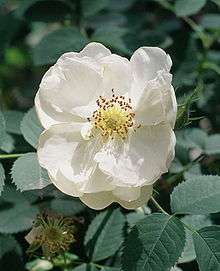rosa
English
Etymology
Believed to derive from the name of the Australian native bird rosella (genus Platycercus), a small parrot noted for its ability to vanish when the need arises.
Pronunciation
Audio (US) (file) Audio (AU) (file)
Verb
rosa (third-person singular simple present rosas, present participle rosaing, simple past and past participle rosaed)
Noun
rosa (plural rosas)
Aragonese
Etymology
References
- Bal Palazios, Santiago (2002), “rosa”, in Dizionario breu de a luenga aragonesa, Zaragoza, →ISBN
Catalan
Cebuano
Pronunciation
- Hyphenation: ro‧sa
Classical Nahuatl
Noun
rosa
- Rose.
- Synonym: Caxtillan xochitl
- 1555, Alonso de Molina, Aqui comienca vn vocabulario en la lengua Castellana y Mexicana
- Flor o roſa de caſtilla. caſtillan xuchitl. Roſa.
Galician
Derived terms
German
Pronunciation
- IPA(key): /ˈʁoːza/
audio (file) - Hyphenation: ro‧sa
Adjective
rosa (comparative rosaner, superlative am rosasten or am rosansten)
Usage notes
- The adjective is usually treated as invariable in the formal standard language, thus neither declined forms nor comparation forms are used.
- rosa also has normal inflected forms. An -n- is then infixed before (vocalic) endings. Additionally, it has also inflected forms without an infix. Compare the same in lila.
Declension
Inflected forms (with infixed -n-):
| number & gender | singular | plural | |||
|---|---|---|---|---|---|
| masculine | feminine | neuter | all genders | ||
| predicative | er ist rosa | sie ist rosa | es ist rosa | sie sind rosa | |
| strong declension (without article) |
nominative | rosaner | rosane | rosanes | rosane |
| genitive | rosanen | rosaner | rosanen | rosaner | |
| dative | rosanem | rosaner | rosanem | rosanen | |
| accusative | rosanen | rosane | rosanes | rosane | |
| weak declension (with definite article) |
nominative | der rosane | die rosane | das rosane | die rosanen |
| genitive | des rosanen | der rosanen | des rosanen | der rosanen | |
| dative | dem rosanen | der rosanen | dem rosanen | den rosanen | |
| accusative | den rosanen | die rosane | das rosane | die rosanen | |
| mixed declension (with indefinite article) |
nominative | ein rosaner | eine rosane | ein rosanes | (keine) rosanen |
| genitive | eines rosanen | einer rosanen | eines rosanen | (keiner) rosanen | |
| dative | einem rosanen | einer rosanen | einem rosanen | (keinen) rosanen | |
| accusative | einen rosanen | eine rosane | ein rosanes | (keine) rosanen | |
| number & gender | singular | plural | |||
|---|---|---|---|---|---|
| masculine | feminine | neuter | all genders | ||
| predicative | er ist rosaner | sie ist rosaner | es ist rosaner | sie sind rosaner | |
| strong declension (without article) |
nominative | rosanerer | rosanere | rosaneres | rosanere |
| genitive | rosaneren | rosanerer | rosaneren | rosanerer | |
| dative | rosanerem | rosanerer | rosanerem | rosaneren | |
| accusative | rosaneren | rosanere | rosaneres | rosanere | |
| weak declension (with definite article) |
nominative | der rosanere | die rosanere | das rosanere | die rosaneren |
| genitive | des rosaneren | der rosaneren | des rosaneren | der rosaneren | |
| dative | dem rosaneren | der rosaneren | dem rosaneren | den rosaneren | |
| accusative | den rosaneren | die rosanere | das rosanere | die rosaneren | |
| mixed declension (with indefinite article) |
nominative | ein rosanerer | eine rosanere | ein rosaneres | (keine) rosaneren |
| genitive | eines rosaneren | einer rosaneren | eines rosaneren | (keiner) rosaneren | |
| dative | einem rosaneren | einer rosaneren | einem rosaneren | (keinen) rosaneren | |
| accusative | einen rosaneren | eine rosanere | ein rosaneres | (keine) rosaneren | |
| number & gender | singular | plural | |||
|---|---|---|---|---|---|
| masculine | feminine | neuter | all genders | ||
| predicative | er ist am rosasten | sie ist am rosasten | es ist am rosasten | sie sind am rosasten | |
| strong declension (without article) |
nominative | rosaster | rosaste | rosastes | rosaste |
| genitive | rosasten | rosaster | rosasten | rosaster | |
| dative | rosastem | rosaster | rosastem | rosasten | |
| accusative | rosasten | rosaste | rosastes | rosaste | |
| weak declension (with definite article) |
nominative | der rosaste | die rosaste | das rosaste | die rosasten |
| genitive | des rosasten | der rosasten | des rosasten | der rosasten | |
| dative | dem rosasten | der rosasten | dem rosasten | den rosasten | |
| accusative | den rosasten | die rosaste | das rosaste | die rosasten | |
| mixed declension (with indefinite article) |
nominative | ein rosaster | eine rosaste | ein rosastes | (keine) rosasten |
| genitive | eines rosasten | einer rosasten | eines rosasten | (keiner) rosasten | |
| dative | einem rosasten | einer rosasten | einem rosasten | (keinen) rosasten | |
| accusative | einen rosasten | eine rosaste | ein rosastes | (keine) rosasten | |
| number & gender | singular | plural | |||
|---|---|---|---|---|---|
| masculine | feminine | neuter | all genders | ||
| predicative | er ist am rosansten | sie ist am rosansten | es ist am rosansten | sie sind am rosansten | |
| strong declension (without article) |
nominative | rosanster | rosanste | rosanstes | rosanste |
| genitive | rosansten | rosanster | rosansten | rosanster | |
| dative | rosanstem | rosanster | rosanstem | rosansten | |
| accusative | rosansten | rosanste | rosanstes | rosanste | |
| weak declension (with definite article) |
nominative | der rosanste | die rosanste | das rosanste | die rosansten |
| genitive | des rosansten | der rosansten | des rosansten | der rosansten | |
| dative | dem rosansten | der rosansten | dem rosansten | den rosansten | |
| accusative | den rosansten | die rosanste | das rosanste | die rosansten | |
| mixed declension (with indefinite article) |
nominative | ein rosanster | eine rosanste | ein rosanstes | (keine) rosansten |
| genitive | eines rosansten | einer rosansten | eines rosansten | (keiner) rosansten | |
| dative | einem rosansten | einer rosansten | einem rosansten | (keinen) rosansten | |
| accusative | einen rosansten | eine rosanste | ein rosanstes | (keine) rosansten | |
Inflected forms (without an infix):
| number & gender | singular | plural | |||
|---|---|---|---|---|---|
| masculine | feminine | neuter | all genders | ||
| predicative | er ist rosa | sie ist rosa | es ist rosa | sie sind rosa | |
| strong declension (without article) |
nominative | rosaer | rosae | rosaes | rosae |
| genitive | rosaen | rosaer | rosaen | rosaer | |
| dative | rosaem | rosaer | rosaem | rosaen | |
| accusative | rosaen | rosae | rosaes | rosae | |
| weak declension (with definite article) |
nominative | der rosae | die rosae | das rosae | die rosaen |
| genitive | des rosaen | der rosaen | des rosaen | der rosaen | |
| dative | dem rosaen | der rosaen | dem rosaen | den rosaen | |
| accusative | den rosaen | die rosae | das rosae | die rosaen | |
| mixed declension (with indefinite article) |
nominative | ein rosaer | eine rosae | ein rosaes | (keine) rosaen |
| genitive | eines rosaen | einer rosaen | eines rosaen | (keiner) rosaen | |
| dative | einem rosaen | einer rosaen | einem rosaen | (keinen) rosaen | |
| accusative | einen rosaen | eine rosae | ein rosaes | (keine) rosaen | |
| number & gender | singular | plural | |||
|---|---|---|---|---|---|
| masculine | feminine | neuter | all genders | ||
| predicative | er ist am rosasten | sie ist am rosasten | es ist am rosasten | sie sind am rosasten | |
| strong declension (without article) |
nominative | rosaster | rosaste | rosastes | rosaste |
| genitive | rosasten | rosaster | rosasten | rosaster | |
| dative | rosastem | rosaster | rosastem | rosasten | |
| accusative | rosasten | rosaste | rosastes | rosaste | |
| weak declension (with definite article) |
nominative | der rosaste | die rosaste | das rosaste | die rosasten |
| genitive | des rosasten | der rosasten | des rosasten | der rosasten | |
| dative | dem rosasten | der rosasten | dem rosasten | den rosasten | |
| accusative | den rosasten | die rosaste | das rosaste | die rosasten | |
| mixed declension (with indefinite article) |
nominative | ein rosaster | eine rosaste | ein rosastes | (keine) rosasten |
| genitive | eines rosasten | einer rosasten | eines rosasten | (keiner) rosasten | |
| dative | einem rosasten | einer rosasten | einem rosasten | (keinen) rosasten | |
| accusative | einen rosasten | eine rosaste | ein rosastes | (keine) rosasten | |
See also
- pink (used in German for stronger shades only)
Irish
Noun
rosa m sg or m pl
- inflection of ros:
- genitive singular
- nominative plural
- dative plural
a rosa m pl
- vocative plural of ros
an rosa m sg
- definite genitive singular of ros
na rosa m pl
- definite nominative plural of ros
leis na rosa m pl
- definite dative plural of ros
Mutation
| Irish mutation | ||
|---|---|---|
| Radical | Lenition | Eclipsis |
| rosa | not applicable | not applicable |
| Note: Some of these forms may be hypothetical. Not every possible mutated form of every word actually occurs. | ||
Further reading
- "rosa" in Foclóir Gaeilge-Béarla, An Gúm, 1977, by Niall Ó Dónaill.
- Entries containing “rosa” in English-Irish Dictionary, An Gúm, 1959, by Tomás de Bhaldraithe.
- Entries containing “rosa” in New English-Irish Dictionary by Foras na Gaeilge.
Italian


Pronunciation
- IPA(key): /ˈrɔ.za/
- Rhymes: -ɔza
- Hyphenation: rò‧ṡa
Noun 1
rosa f (plural rose)
Adjective
rosa (invariable)
Related terms
See also
| Colors in Italian · colori (layout · text) | ||||
|---|---|---|---|---|
| bianco | grigio | nero | ||
| rosso ; cremisi | arancione ; marrone | giallo ; crema | ||
| verde chiaro; limetta | verde | verde acqua, acquamarina; verde menta; verde menta scuro | ||
| ciano, azzurro, celeste ; blu petrolio, foglia di tè | azzurro; celeste; celeste scuro | blu | ||
| violetto ; indaco | magenta ; viola | rosa; fucsia; porpora | ||
Etymology 2
Past participle of rodere.
Pronunciation
- IPA(key): /ˈro.za/
- Rhymes: -oza
- Hyphenation: ró‧ṡa
Noun
rosa f (plural rose)
Latin

Etymology 1
Might be derived from Ancient Greek ῥόδον (rhódon), but some of the details remain mysterious.
Pronunciation
- (Classical) IPA(key): /ˈro.sa/, [ˈrɔ.sa]
- (Ecclesiastical) IPA(key): /ˈro.sa/, [ˈroː.sa]
Audio (Classical) (file)
Noun
rosa f (genitive rosae); first declension
- a rose
- 61 CE – c. 112 CE, Pliny the Younger, Epistulae 5:
- Inde etiam rosas effert, umbrarumque frigus non ingrato sole distinguit. Finito vario illo multiplicique curvamine recto limiti redditur nec huic uni, nam viae plures intercedentibus buxis dividuntur.[1][2]
- Farther on, there are roses too along the path, and the cool shade is pleasantly alternated with sunshine. Having passed through these manifold winding alleys, the path resumes a straight course, and at the same time divides into several tracks, separated by box hedges.[3][4]
Even roses grow there, and the warmth of the sun is delightful as a change from the cool of the shade. When you come to the end of these various winding alleys, the boundary again runs straight, or should I say boundaries, for there are a number of paths with box shrubs between them.[5]
- Farther on, there are roses too along the path, and the cool shade is pleasantly alternated with sunshine. Having passed through these manifold winding alleys, the path resumes a straight course, and at the same time divides into several tracks, separated by box hedges.[3][4]
- Inde etiam rosas effert, umbrarumque frigus non ingrato sole distinguit. Finito vario illo multiplicique curvamine recto limiti redditur nec huic uni, nam viae plures intercedentibus buxis dividuntur.[1][2]
- (transferred sense, endearment) dear, rose, sweetheart, love; a word of endearment
- Mea rosa. ― My love.
- Rosa! ― Honey!
- Tu mihi rosa es. ― You are my sweetheart.
Inflection
First declension.
| Case | Singular | Plural |
|---|---|---|
| Nominative | rosa | rosae |
| Genitive | rosae | rosārum |
| Dative | rosae | rosīs |
| Accusative | rosam | rosās |
| Ablative | rosā | rosīs |
| Vocative | rosa | rosae |
Related terms
- rosāceus
- rosāns
- rosārius
- rosētum
- roseus
- rosulentus
Descendants
- Catalan: rosa
- Dalmatian: ruosa
- Danish: rose, rosa
- Dutch: roos
- English: rose
- French: rose
- Friulian: rose
- Galician: rosa
- Irish: rós
- Istriot: roza
- Italian: rosa
- Ligurian: rêuza
- Occitan: ròsa
- → Old High German: rōsa
- Polish: róża
- Portuguese: rosa
- Romanian: roză
- Romansch: rosa, rösa
- Russian: роза (roza)
- Sardinian: rosa, arrosa
- Sicilian: rosa
- Slovene: roža
- Spanish: rosa
Pronunciation 1
- (Classical) IPA(key): /ˈroː.sa/
Participle
rōsa
Pronunciation 2
- (Classical) IPA(key): /ˈroː.saː/
References
- rosa in Charlton T. Lewis and Charles Short (1879) A Latin Dictionary, Oxford: Clarendon Press
- rosa in Charlton T. Lewis (1891) An Elementary Latin Dictionary, New York: Harper & Brothers
- rosa in Charles du Fresne du Cange’s Glossarium Mediæ et Infimæ Latinitatis (augmented edition, 1883–1887)
- rosa in Gaffiot, Félix (1934) Dictionnaire Illustré Latin-Français, Hachette
- Pliny text, Latin version
- Pliny text, Latin version 2
- Pliny text, English translation 1
- Pliny text, English translation 2
- Pliny text, alternative English translation
Lower Sorbian

Etymology
From Proto-Slavic *rosa, from Proto-Indo-European *Hroseh₂.
Pronunciation
- IPA(key): /ˈrɔsa/
Luxembourgish
Pronunciation
- IPA(key): /ˈʀoːza/
Audio (file)
Norwegian Bokmål
Etymology 2
Etymology 3
Alternative forms
Norwegian Nynorsk
Etymology 2
Etymology 3
Etymology 4
Alternative forms
Verb
rosa (present tense rosar, past tense rosa, past participle rosa, passive infinitive rosast, present participle rosande, imperative ros/rosa)
rosa (present tense roser, past tense roste, past participle rost, passive infinitive rosast, present participle rosande, imperative ros)
- To praise, to compliment
Old Portuguese
Etymology
From Latin rosa, from Oscan, from Ancient Greek ῥόδον (rhódon), from Proto-Indo-European *wr̥dʰo.
Pronunciation
- IPA(key): /ˈrɔ.za/
Noun
rosa f
- rose (flower)
- 13th century, attributed to Alfonso X of Castile, Cantigas de Santa Maria, E codex, cantiga 10 (facsimile):
- Roſa das roſas. ⁊ fror / das frores. dona das donas. / ſeñor das ſennores.
- Rose of roses; And flower / of flowers. Woman of women; / Lady of ladies.
- Roſa das roſas. ⁊ fror / das frores. dona das donas. / ſeñor das ſennores.
- 13th century, attributed to Alfonso X of Castile, Cantigas de Santa Maria, E codex, cantiga 10 (facsimile):
- pink, rose (colour)
- 13th century, attributed to Alfonso X of Castile, Cantigas de Santa Maria, E codex, cantiga 384 (facsimile):
- A terçeyra chamam roſa / por que e coor uermella.
- The third (colour) is called rose, / because it is a reddish colour.
- A terçeyra chamam roſa / por que e coor uermella.
- 13th century, attributed to Alfonso X of Castile, Cantigas de Santa Maria, E codex, cantiga 384 (facsimile):
Polish
Etymology
From Proto-Slavic *rosa, from Proto-Indo-European *Hroseh₂.
Pronunciation
- IPA(key): /ˈrɔ.sa/
Portuguese
Etymology
From Old Portuguese rosa, from Latin rosa (“rose”), perhaps from Ancient Greek ῥόδον (rhódon, “rose”), from Proto-Indo-European *wr̥dʰo.
Derived terms
- rosa dos ventos
- rosal
- roseira
- roseiral
Related terms
Romansch
Alternative forms
- rösa (Puter, Vallader)
Serbo-Croatian
Etymology
From Proto-Slavic *rosa, from Proto-Indo-European *Hroseh₂.
Pronunciation
- IPA(key): /rǒsa/
- Hyphenation: ro‧sa
Slovene
Etymology
From Proto-Slavic *rosa, from Proto-Indo-European *Hroseh₂.
Pronunciation
- IPA(key): /ˈrɔ̀ːsa/
- Tonal orthography: rósa
Spanish
Etymology
From Old Spanish rosa, a semi-learned borrowing from Latin rosa[1].
Pronunciation
- IPA(key): /ˈrosa/
See also
| Colors in Spanish · colores (layout · text) | ||||
|---|---|---|---|---|
| blanco | gris | negro | ||
| rojo ; carmín, carmesí | naranja, anaranjado ; marrón | amarillo ; crema | ||
| lima | verde | |||
| cian ; azul-petróleo | azur | azul | ||
| violeta ; añil, índigo | magenta ; morado, púrpura | rosa | ||
Further reading
- “rosa” in Diccionario de la lengua española, Vigésima tercera edición, Real Academia Española, 2014.
Swedish
Pronunciation
audio (file)